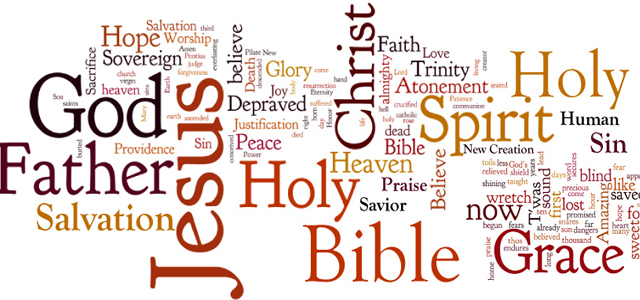The story of scripture begins with the Spirit brooding over the abyss, ready to bring forth creation out of nothing (Gen 1:2). And at the turning point of the ages we find the Spirit brooding over the womb of a virgin (Luke 1:35). The Spirit rests on Mary’s body in order to bring forth the new Adam, the beginning of a new creation.
The Apostles’ Creed reminds us that the work of this creative Spirit is not yet finished. The same Spirit is now brooding over the whole human race, bringing forth a new human community in the image of Christ.
One of the great themes of the Bible is the unity of the human family. In the Garden of Eden, God makes a man and a woman, a miniature society imprinted with God’s own image. And the Bible ends with depictions of a future city where people from every tribe and language will live together in a perfect harmony of praise (Rev 7:9).
In Genesis, the fall brings about a tragic disordering of human relationships. The relation between humans and the rest of creation is blighted (Gen 3:14-19). Thus the whole world of creation is divided. Each human being is a fragment torn loose from the whole.
This grim assessment of human fallenness culminates in the story of Babel (Gen 11:1-9). Here, human beings have begun to use their collective life to mock God. And so God divides their language, making it impossible for them to work together. Each group is a mere splinter of humanity, all scattered across the cursed earth, exiled and alone.
But with the coming of Christ, the story of Babel is reversed. When the Spirit descends on the frightened company of Jesus’ followers, they all begin to speak in many different languages. The multicultural crowd outside is astonished to find that each one’s language is being spoken by this band of Galileans. They ask, “How is it that we hear, each of us, in our own native language?” (Acts 2:1-13).
The Pentecost story shows the undoing of the fall through the creation of the Church. There is now a new human society in which all the old divisions are torn down. That is what happens when the Spirit is present. The Spirit fulfills God’s original plan by bringing forth this new community. Thus the creed reminds us of the link between the Spirit and the “one holy catholic church” – the new universal community whose boundaries are as wide as the world. The Spirit broods over the chaos of human nature, lovingly piecing the fragments back together and forming us into the divine image.
St Paul notes that the presence of the Spirit is marked by a heightened individuality as well as a deeper sense of communal belonging. The Spirit fuses unity and diversity by bringing “many gifts” together in “one body” (1 Cor 12). We become more truly ourselves as the Spirit broods over us, and we also discover that our lives have been knit together with other lives and stories.
In this way the Spirit broods over each of Christ’s followers, renewing the human race one life at a time, while also drawing all of us into a common family. A great fourth-century pastor, Basil, explained it like this: the Spirit “Is like a sunbeam whose grace is present to the one who enjoys it as if it were present to that one alone, yet it illuminates land and sea and the air.” There is nothing more personal, and more universal, than the Holy Spirit.
Ben Myers is Lecturer in Systematic Theology at United Theological College





